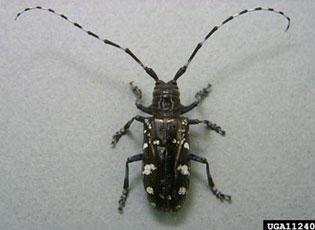Anoplophora glabripennis (Motschulsky, 1853) (ITIS)
Asian long-horned beetle (ALB), starry sky beetle
Asia (Hu et al. 2009)
First breeding populations discovered in New York in 1996 (Haack et al. 2010)
Arrived accidentally in cargo from Asia (Hu et al. 2009)
Destructive wood-boring pest of maple and other hardwoods (Haack et al. 2010)

Asian Longhorned Beetle, adult
Photo by Donald Duerr; USDA, Forest Service
Spotlights
Distribution / Maps / Survey Status
Federally Regulated
Videos
All Resources
Selected Resources
The section below contains highly relevant resources for this species, organized by source.
Council or Task Force
Partnership
Federal Government
International Government
State and Local Government
Academic
Professional
Haack, R.A., F. Herard, J. Sun, and J.J. Turgeon. 2010. Managing invasive populations of Asian longhorned beetle and citrus longhorned beetle: a worldwide perspective. Annual Review of Entomology 55:521-546.
Hu, J., S. Angeli, S. Schuetz, Y. Luo, and A.E. Hajek. 2009. Ecology and management of exotic and endemic Asian longhorned beetle Anoplophora glabripennis. Agricultural and Forest Entomology 11(4):359-375.
Integrated Taxonomic Information System. Anoplophora glabripennis. [Accessed Mar 12, 2023].
